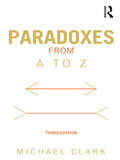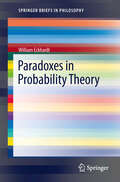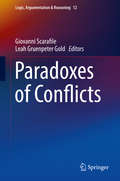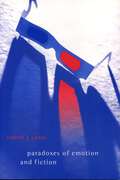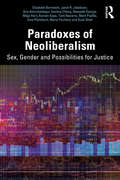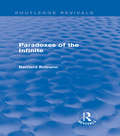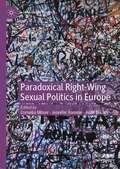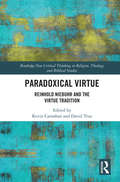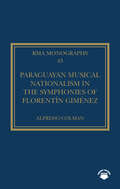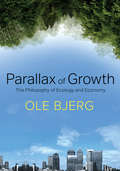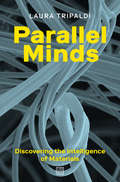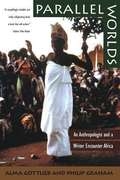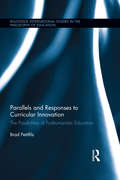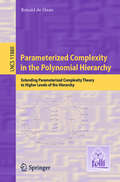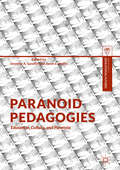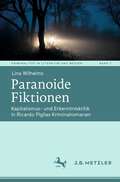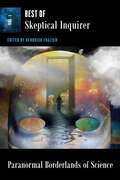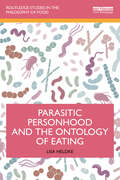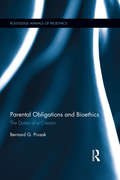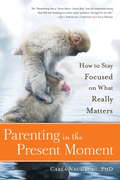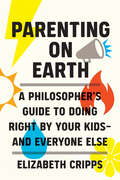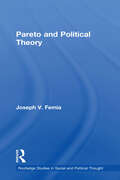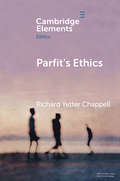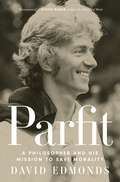- Table View
- List View
Paradoxes from A to Z
by Michael ClarkParadoxes from A to Z, Third edition is the essential guide to paradoxes, and takes the reader on a lively tour of puzzles that have taxed thinkers from Zeno to Galileo, and Lewis Carroll to Bertrand Russell. Michael Clark uncovers an array of conundrums, such as Achilles and the Tortoise, Theseus’ Ship, and the Prisoner’s Dilemma, taking in subjects as diverse as knowledge, science, art and politics. Clark discusses each paradox in non-technical terms, considering its significance and looking at likely solutions. This third edition is revised throughout, and adds nine new paradoxes that have important bearings in areas such as law, logic, ethics and probability. Paradoxes from A to Z, Third edition is an ideal starting point for those interested not just in philosophical puzzles and conundrums, but anyone seeking to hone their thinking skills.
Paradoxes in Probability Theory
by William EckhardtParadoxes provide a vehicle for exposing misinterpretations and misapplications of accepted principles. This book discusses seven paradoxes surrounding probability theory. Some remain the focus of controversy; others have allegedly been solved, however the accepted solutions are demonstrably incorrect. Each paradox is shown to rest on one or more fallacies. Instead of the esoteric, idiosyncratic, and untested methods that have been brought to bear on these problems, the book invokes uncontroversial probability principles, acceptable both to frequentists and subjectivists. The philosophical disputation inspired by these paradoxes is shown to be misguided and unnecessary; for instance, startling claims concerning human destiny and the nature of reality are directly related to fallacious reasoning in a betting paradox, and a problem analyzed in philosophy journals is resolved by means of a computer program.
Paradoxes of Conflicts
by Giovanni Scarafile Leah Gruenpeter GoldThis volume features more than 25 papers that were presented at the 2014 Conference of the International Association for the Study of Controversies, IASC, held at the University of Salento, Lecce, Italy. It looks at conflict and conflict resolution from diverse perspectives, including philosophy, psychology, law, and history. Coverage explores the paradox of conflict and examines how discord, whether large or small, international or internal, can be both a source of chaos as well as a foundation for unity, a limitation of potential as well as an entryway to a greater depth of living. Inside, readers will discover thought-provoking answers to such questions as: What are the conditions to ensure that a conflict can be converted into cooperation? If the conflict between interests can be solved by a compromise, what happens when a conflict involves non-negotiable values? In the management of a conflict, what role is played by argumentation? What are the latest perspectives in conflict management? How does the theory of controversies allows us to recognize and resolve conflicts? By the end of the book, readers will have a better understanding of how conflict can be transcended and how it's possible to redefine the conflicting situation so that what seemed incompatible and locked may, in fact, open a new perspective.
Paradoxes of Emotion and Fiction (G - Reference, Information and Interdisciplinary Subjects)
by Robert J. YanalHow can we experience real emotions when viewing a movie or reading a novel or watching a play when we know the characters whose actions have this effect on us do not exist? This is a conundrum that has puzzled philosophers for a long time, and in this book Robert Yanal both canvasses previously proposed solutions to it and offers one of his own.First formulated by Samuel Johnson, the paradox received its most famous answer from Samuel Taylor Coleridge, who advised his readers to engage in a "willing suspension of disbelief." More recently, philosophers have argued that we are irrational in emoting toward fiction, or that we do not emote toward fiction but rather toward factual counterparts, or that we do not have real but only quasi-emotion toward fiction, generated by our playing games of make-believe. All of these proposed solutions are critically reviewed.Finding these answers unsatisfactory, Yanal offers an alternative, providing a new version of what has been dubbed "thought theory." On this theory, mere thoughts not believed true are seen as the functional equivalent of belief at least insofar as stimulating emotion is concerned. The emoter's disbelief in the actuality of components of the thoughts must be rendered relatively inactive. Such emotion is real and typically has the character of being richly generated yet unconsummated.The book extends this theory also to resolving other paradoxes arising from emotional response to fiction: how we feel suspense over what comes next in a story even when we are re-reading it for a second or third time; and how we take pleasure in narratives, such as tragedy, that excite unpleasant emotions such as fear, pity, or horror.
Paradoxes of Neoliberalism: Sex, Gender and Possibilities for Justice (Social Justice)
by Janet Jakobsen and Elizabeth BernsteinFrom the rise of far-right regimes to the tumult of the COVID-19 pandemic, recent years have brought global upheaval as well as the sedimentation of longstanding social inequalities. Analyzing the complexities of the current political moment in different geographic regions, this book addresses the paradoxical persistence of neoliberal policies and practices, in order to ground the pursuit of a more just world. Engaging theories of decoloniality, racial capitalism, queer materialism, and social reproduction, this book demonstrates the centrality of sexual politics to neoliberalism, including both social relations and statecraft. Drawing on ethnographic case studies, the authors show that gender and sexuality may be the site for policies like those pertaining to sex trafficking, which bundle together economics and changes to the structure of the state. In other instances, sexual politics are crucial components of policies on issues ranging from the growth of financial services to migration. Tracing the role of sexual politics across different localities and through different political domains, this book delineates the paradoxical assemblage that makes up contemporary neoliberal hegemony. In addition to exploring contemporary social relations of neoliberal governance, exploitation, domination, and exclusion, the authors also consider gender and sexuality as forces that have shaped myriad forms of community-based activism and resistance, including local efforts to pursue new forms of social change. By tracing neoliberal paradoxes across global sites, the book delineates the multiple dimensions of economic and cultural restructuring that have characterized neoliberal regimes and emergent activist responses to them. This innovative analysis of the relationship between gender justice and political economy will appeal to: interdisciplinary scholars in social and cultural studies; legal and political theorists; and the wide range of readers who are concerned with contemporary questions of social justice.
Paradoxes of the Infinite (Routledge Revivals)
by Bernard BolzanoParadoxes of the Infinite presents one of the most insightful, yet strangely unacknowledged, mathematical treatises of the 19th century: Dr Bernard Bolzano’s Paradoxien. This volume contains an adept translation of the work itself by Donald A. Steele S.J., and in addition an historical introduction, which includes a brief biography as well as an evaluation of Bolzano the mathematician, logician and physicist.
Paradoxical Right-Wing Sexual Politics in Europe (Global Queer Politics)
by Cornelia Möser Jennifer Ramme Judit TakácsHow did far-right, hateful and anti-democratic ideologies become so successful in many societies in Europe? This volume analyses the paradoxical roles sexual politics have played in this process and reveals that the incoherence and untruthfulness in right-wing populist, ultraconservative and far-right rhetorics of fear are not necessarily signs of weakness. Instead, the authors show how the far right can profit from its own incoherence by generating fear and creating discourses of crisis for which they are ready to offer simple solutions. In studies on Poland, Hungary, Spain, Italy, Austria, Ireland, Northern Ireland, Portugal, France, Sweden and Russia, the ways far-right ideologies travel and take root are analysed from a multi-disciplinary perspective, including feminist and LGBTQI reactions. Understanding how hateful and antidemocratic ideologies enter the very centre of European societies is a necessary premise for developing successful counterstrategies.
Paradoxical Virtue: Reinhold Niebuhr and the Virtue Tradition (Routledge New Critical Thinking in Religion, Theology and Biblical Studies)
by Kevin Carnahan David TrueAfter the re-emergence of the tradition of virtue ethics in the early 1980s Reinhold Niebuhr has often served as a foil for authors who locate themselves in that tradition. However, this exercise has often proved controversial. This collection of essays continues this work, across a wide range of subjects, with the aim of avoiding some of the polemics that have previously accompanied it. The central thesis of this book is that putting the work of Reinhold Niebuhr and Christian realism in dialogue with contemporary virtue theory is a profitable undertaking. An introductory essay argues against locating Niebuhr as a consequentialist and in favour of thinking of his work in terms of a dispositional ethics Contributors take different positions on whether Niebuhr’s dispositional ethics should be considered a form of virtue ethics or an alternative to virtue ethics. Several of the articles relate Niebuhr and Christian realism to particular virtues. Throughout there is an appreciation of the ways in which any Niebuhrian approach to dispositional ethics or virtue must be shaped by a sense of tragedy, paradox, or irony. The most moral disposition will be one which includes doubts about its own virtue. This volume allows for a repositioning of Niebuhr in the context of contemporary moral theory as well as a rereading of the tradition of virtue ethics in the light of a distinctly Protestant, Christian realist and paradoxical view of virtue. As a result, it will be of great interest to scholars of Niebuhr and Christian Ethics and scholars working in Moral Philosophy and the Philosophy of Religion more generally.
Paraguayan Musical Nationalism in the Symphonies of Florentín Giménez (Royal Musical Association Monographs)
by Alfredo ColmanThis study of the music and career of Florentín Giménez discusses the various ways in which he expressed his Paraguayan cultural identity and musical nationalism through his symphonies.Florentín Giménez (1925–2021) stands as one of the most prolific Paraguayan composers of both concert and folk music-style works. Colman argues that not only Giménez’s musical nationalism was a lens to reflect an ideal Paraguayan cultural identity, but indeed a means to develop it. Topics are approached with a threefold goal in mind: to provide a biography of the composer, to consider the various cultural themes associated with his compositions, and to give an overview of his symphonies. A chronological list of his compositions—including the dates of their premieres, soloists, ensembles, and conductors—appears in the Appendix as a reference guide.
Parallax of Growth: The Philosophy of Ecology and Economy
by Ole BjergParallax of Growth explores the ideas of economy and ecology and the factors that have put them on a collision course. Bjerg argues that our current mode of economic organization is characterized by an inherent ?debt drive?, whereby the creation of money through the issuance of commercial bank credit has locked our economy into a vicious circle of forced growth and increasing debt. Parallax of Growth is not a catalogue of solutions to the ecological or the economic crisis. The book aims to shift the inquiry from ?what shall we do?? to ?why have we not already done it?? In order to address the challenges of our contemporary times of crisis, we need to understand how the idea of growth is deeply ingrained in the ideology as well as the organization of our society. The book aims to open the space for philosophical thinking about this important issue.
Parallel Minds: Discovering the Intelligence of Materials
by Laura TripaldiInsights into the intelligence throughout the natural and technical environment, in the fabric of our devices and dwellings, in our clothes, and under our skin.Is there a way to understand the materials that surround us not as passive objects, but as other intelligences interacting with our own? In Parallel Minds, expert in materials science and nanotechnology Laura Tripaldi delivers not only detailed insights into the properties and emergent behaviors of matter as revealed by state-of-the-art chemistry, synthetic biology, and nanotech, but also a rich philosophical reflection that crosses the frontier between nature and culture, where the most cutting-edge scientific syntheses resonate with ancient myth. The result is a technomaterial bestiary full of unexpected encounters with &“strange minds&”—from cobwebs to kevlar and carbon fibre, from centaurs to amoebas to arachnids, from polycephalic slime to resonating plasmons, from viruses to golems. Parallel Minds reveals the intelligence at large throughout the natural and technical environment, in the fabric of our devices and dwellings, in our clothes, and even under our skin. Full of lateral ideas and unexpected images, Tripaldi&’s book imbues the study and synthesis of materials with a new urgency. For not only do the materials that surround us participate actively in the construction of the world in which we live, but harnessing their ability to interact intelligently with their environment could be the key to the future of our species.
Parallel Worlds: An Anthropologist and a Writer Encounter Africa
by Philip Graham Alma GottliebThis suspenseful and moving memoir of Africa recounts the experiences of Alma Gottlieb, an anthropologist, and Philip Graham, a fiction writer, as they lived in two remote villages in the rain forest of Cote d'Ivoire. With an unusual coupling of first-person narratives, their alternate voices tell a story imbued with sweeping narrative power, humility, and gentle humor. Parallel Worlds is a unique look at Africa, anthropological fieldwork, and the artistic process. "A remarkable look at a remote society [and] an engaging memoir that testifies to a loving partnership . . . compelling. "—James Idema, Chicago Tribune
Parallels and Responses to Curricular Innovation: The Possibilities of Posthumanistic Education (Routledge International Studies in the Philosophy of Education #36)
by Brad PetitfilsThis volume explores two radical shifts in history and subsequent responses in curricular spaces: the move from oral to print culture during the transition between the 15th and 16th centuries and the rise of the Jesuits, and the move from print to digital culture during the transition between the 20th and 21st centuries and the rise of what the philosopher Jean Baudrillard called "hyperreality." The curricular innovation that accompanied the first shift is considered through the rise of the Society of Jesus (the Jesuits). These men created the first "global network" of education, and developed a humanistic curriculum designed to help students navigate a complicated era of the known (human-centered) and unknown (God-centered) universe. The curricular innovation that is proposed for the current shift is guided by the question: What should be the role of undergraduate education become in the 21st century? Today, the tension between the known and unknown universe is concentrated on the interrelationships between our embodied spaces and our digitally mediated ones. As a result, today’s undergraduate students should be challenged to understand how—in the objectively focused, commodified, STEM-centric landscape of higher education—the human subject is decentered by the forces of hyperreality, and in turn, how the human subject might be recentered to balance our humanness with the new realities of digital living. Therein, one finds the possibility of posthumanistic education.
Parameterized Complexity in the Polynomial Hierarchy: Extending Parameterized Complexity Theory to Higher Levels of the Hierarchy (Lecture Notes in Computer Science #11880)
by Ronald de HaanParameterized Complexity in the Polynomial Hierarchy was co-recipient of the E.W. Beth Dissertation Prize 2017 for outstanding dissertations in the fields of logic, language, and information. This work extends the theory of parameterized complexity to higher levels of the Polynomial Hierarchy (PH). For problems at higher levels of the PH, a promising solving approach is to develop fixed-parameter tractable reductions to SAT, and to subsequently use a SAT solving algorithm to solve the problem. In this dissertation, a theoretical toolbox is developed that can be used to classify in which cases this is possible. The use of this toolbox is illustrated by applying it to analyze a wide range of problems from various areas of computer science and artificial intelligence.
Paranoid Pedagogies
by Jason J. Wallin Jennifer A. SandlinThis edited book explores the under-analyzed significance and function of paranoia as a psychological habitus of the contemporary educational and social moment. The editors and contributors argue that the desire for epistemological truth beyond uncertainty characteristic of paranoia continues to profoundly shape the aesthetic texture and imaginaries of educational thought and practice. Attending to the psychoanalytic, post-psychoanalytic, and critical significance of paranoia as a mode of engaging with the world, this book further inquires into the ways in which paranoia functions to shape the social order and the material desire of subjects operating within it. Furthermore, the book aims to understand how the paranoiac imaginary endemic to contemporary educational thought manifests itself throughout the social field and what issues it makes manifest for teachers, teacher educators, and academics working toward social transformation.
Paranoide Fiktionen: Kapitalismus- und Erkenntniskritik in Ricardo Piglias Kriminalromanen (Kriminalität in Literatur und Medien #7)
by Lina WilhelmsRicardo Piglias Kriminalromane haben das Genre kritisch beleuchtet und erneuert. Die Untersuchung kapitalismus- und erkenntniskritischer Perspektiven in Plata quemada, Blanco nocturno und El camino de Ida verbindet literaturtheoretische mit -historischen Reflexionen. Ausgehend von der These, dass die bürgerlich-kapitalistische Gesellschaft sowie Diskurse um Aufklärung und Positivismus zentrale Entstehungsbedingungen des Kriminalromans sind, wird nach den Möglichkeiten und Grenzen ihrer Kritik sowie einer dem Genre inhärenten Dialektik gefragt. Mithilfe marxistischer und poststrukturalistischer Ansätze werden Piglias Romane vor dem Hintergrund des argentinischen Kontexts als postmoderne littérature engagée analysiert.Die Arbeit wurde 2023 mit dem Elise Richter-Preis des Deutschen Romanistenverbands ausgezeichnet.
Paranormal Borderlands of Science: Best of Skeptical Inquirer
Headlines and television news reports feature accounts of reincarnation, the predictions of astrologers, and psychic "miracles." Citizens report UFO sightings. Police departments call on psychics to provide clues in baffling crimes. From every available information source, the public is bombarded with unsubstantiated claims of paranormal phenomena. How much of the evidence is reliable? What is the truth behind these claims?Paranormal Borderlands of Science is an exciting, well-informed examination of the most publicized and exotic claims of astrology, ESP, psychokinesis, precognition, UFOs, biorhythms, and other phenomena. Written by respected psychologists, astronomers and other scientists, philosophers, investigative journalists, and magicians, the 47 articles in this superb collection present a skeptical treatment of pseudoscientific claims - an aspect often sorely neglected in sensationalized media reports.This book is an effort to help readers sort fact from fiction and sense from nonsense among the astonishing variety of assertions labeled "paranormal." Never before published in book form, the essays in this anthology originally appeared in the Skeptical Inquirer, a leading magazine devoted to the critical investigation of pseudoscience from a scientific viewpoint.Among the contributors are: Isaac Asimov (distinguished science fiction author), Martin Gardner (Scientific American columnist), James Randi (The Amazing Randi), Philip Klass (noted UFO skeptic), Scot Morris (Omni), and James Oberg (NASA).An essential contribution to skeptical literature, this book will be of lasting value to all those wishing to balance the case for paranormal claims by reading the dissenting critics.
Parascientific Revolutions: The Science and Culture of the Paranormal (Proximities)
by Derek LeeUnraveling the hidden influence of the paranormal on science, literature, and belief Telepathy, clairvoyance, precognition, and telekinesis: these attributes of the paranormal mind are widely dismissed as nonsense, but what can an exploration of such pseudoscientific phenomena tell us about accepted scientific and cultural thought? In Parascientific Revolutions, Derek Lee traces the evolution of psi epistemologies across the twentieth and twenty-first centuries to uncover how these ideas have migrated into scientific fields such as quantum physics and neurology, as well as diverse literary genres including science fiction, ethnic literature, and even government training manuals. Lee introduces the groundbreaking concept of &“parascience,&” a dynamic cultural space where ideas rejected by the scientific establishment blend with alternative strains of literary, mythic, and philosophical thought to regenerate and return to mainstream discourse. From early modernist works by James Joyce to postwar speculative fiction by Philip K. Dick to ethnofuturist narratives by Ruth Ozeki, Parascientific Revolutions demonstrates how cultural and intellectual currents reshape paranormal ideas over time. Examining psychic surveillance programs like Project Stargate and bizarre particles of extrasensory perception such as the psitron, Lee illustrates the ways paranormal concepts persist and evolve to influence culture. Presenting pseudoscience as an inevitable by-product of the scientific process, Parascientific Revolutions offers fresh insight into how the paranormal mind continually challenges our understanding of knowledge and belief. It invites readers to reconsider the boundaries between science and the unknown, revealing a world where speculative thought and empirical investigation are deeply intertwined. Retail e-book files for this title are screen-reader friendly with images accompanied by short alt text and/or extended descriptions.
Parasitic Personhood and the Ontology of Eating (Routledge Studies in the Philosophy of Food)
by Lisa HeldkeHumans must eat, and our eating involves us in a cascade of eating relationships that leave life and death biting into each other.These realities should—but often do not—profoundly shape our understanding of personhood. This book explores “parasitic personhood,” an alternative to atomistic individualism that acknowledges the biological individual as a network of persistent biological relationships (a “holobiont”) and draws insight from the astonishing frequency and variety of parasitic feeding relationships. What happens to our conception of personhood if we consider parasitism as more than just a threat to our health? Parasitism is a remarkably common form of life; however, we tend to think of parasites only as dangerous pestilential organisms that should be eliminated. What if parasitism—in particular, persistent eating relationships that threaten to destabilize host organisms—were instead the model in terms of which we understood what it means to be a person? What if we acknowledged the ineliminability—indeed, the centrality—of parasitism to life and embraced both the persistent eating and the precarity that they entail as central to our understanding of personhood? In advocating for parasitic personhood, this book joins a history of efforts to uproot atomistic individualism, the remarkably durable understanding of personhood that is aptly portrayed by its most well-known eighteenth-century model, the billiard ball: smoothly self-contained, with relationships decidedly external to it. The parasitic alternative conceives persons as collections of organisms in relationships that are, by turns and all at once, essential, precarious, definitive, destabilizing, stable, and shifting. The book asks: in what does parasitic personhood consist? It goes on to examine some implications of this conception of personhood: how is moral agency constituted for the parasitic person, and how does parasitic personhood expand our understanding of aesthetic engagement and appreciation? This book will absorb anyone who is interested in thinking about the metaphysical significance of their need to eat and their reliance on myriad other organisms to enable them to do so.It will engage students and scholars of food and eating, particularly those working on the metaphysics of food, food and personhood, fermentation, and the microbiome, as well as philosophers considering the ontological significance of food and eating.
Parental Obligations and Bioethics: The Duties of a Creator (Routledge Annals of Bioethics #14)
by Bernard G. PrusakThis book examines the question of what parental obligations procreators incur by bringing children into being. Prusak argues that parents, as procreators, have obligations regarding future children that constrain the liberty of would-be parents to do as they wish. Moreover, these obligations go beyond simply respecting a child’s rights. He addresses in turn the ethics of adoption, child support, gamete donation, surrogacy, prenatal genetic enhancement, and public responsibility for children.
Parenting in the Present Moment
by Carla NaumburgThis generation of parents is overwhelmed with parenting advice. Carla Naumburg sets out to remind them that they have everything they need to raise healthy, happy children. Mindful parenting is about paying attention to what is going on with your children and yourself, without judging, freaking out, or thinking everyone should be doing something differently. In Parenting in the Present Moment, Naumburg shares what truly matters in parenting - connecting with children in ways that are meaningful to them and you, staying grounded amid the craziness of parenting, and staying present for whatever life throws your way.With reassuring, compassionate storytelling, she weaves the most current theories - about healthy relationships, compassionate self-care, and mindfulness - throughout vignettes of her own chaotic childhood and parental struggles. She shows how mindfulness creates a solid foundation for any style of parenting, regardless of your cultural background, socioeconomic status, or family structure. She also introduces the STAY model for tough times: Stop whatever it is you're doing; Take a breath; Attune to your thoughts and those of your child; and Yield.Parenting is an ongoing journey that constantly challenges every parent. Parenting in the Present Moment will helps each family find its own way.
Parenting on Earth: A Philosopher's Guide to Doing Right by Your Kids and Everyone Else
by Elizabeth CrippsBeing parents and being human: building hope for our children in a fragile world.Environmental catastrophes, pandemics, antibiotic resistance, institutionalized injustice, and war: in a world so out of balance, what does it take—or even mean—to be a good parent? This book is one woman&’s search for an answer, as a moral philosopher, activist, and mother.Drawing on the insights of philosophy and the experience of parent activists, Elizabeth Cripps calls for parents to think radically about exactly what we owe our children—and everyone else. She shows how our children&’s needs are inseparable from the fate of the earth and the fortunes of others and how much is at stake in parenting today. And she asks the hardest question: should we have kids at all?Timely and thoughtful, Parenting on Earth extends a challenge to anyone raising children in a troubled world—and with it, a vision of hope for our children&’s future. Cripps envisions a world where kids can prosper and grow—a just world, with thriving social systems and ecosystems, where future generations can flourish and all children can lead a decent life. She explains, with bracing clarity, why those raising kids today should be a force for change and bring up their children to do the same. Hard as this can be, in the face of political gridlock, ecoanxiety, and general daily grind, the tools of philosophy and psychology can help us find a way.
Pareto and Political Theory (Routledge Studies in Social and Political Thought #Vol. 48)
by Joseph V. FemiaPareto and Political Theory is the first book-length study of the philosopher’s importance in terms of the most fundamental issues of political discourse: individualism vs. holism, science vs. hermeneutics, laissez-faire vs. social engineering, and value relativism vs. moral absolutism. Joseph V. Femia shows that although Pareto is considered a ‘founding father’ of both sociology and mathematical economics, his contribution to political theory is neither fully recognised nor properly explored. This is also the only book to examine Pareto’s critique of Kantianism and natural law and also includes the first comparison of Pareto’s thought with postmodernism and a detailed refutation of the familiar charge that Pareto was a defender of fascism. This critical, but sympathetic analysis refutes the familiar charge that Pareto was some sort of proto-fascist and instead locates him in the Machiavellian tradition of ‘sceptical liberalism’, which scorns metaphysical abstraction and assigns ontological primacy to the individual. Though suspicious of rational schemes for human improvement, sceptical liberals are equally suspicious of the myths and rhetoric that sustain the status quo. This new volume concludes with a fascinating comparison between Pareto’s scepticism and that of recent postmodernist thought, which also debunks the ‘grand narratives’ of historical progress. This book will be of great interest to all students of politics, philosophy and sociology.
Parfit's Ethics (Elements in Ethics)
by Richard Yetter ChappellDerek Parfit (1942–2017) was one of the most important and influential moral philosophers of the late 20th and early 21st centuries. This Element offers a critical introduction to his wide-ranging ethical thought, focusing especially on his two most significant works, Reasons and Persons (1984) and On What Matters (2011), and their contribution to the consequentialist moral tradition. Topics covered include: rationality and objectivity, distributive justice, self-defeating moral theories, Parfit's Triple Theory (according to which consequentialism, contractualism, and Kantian ethics ultimately converge), personal identity, and population ethics.
Parfit: A Philosopher and His Mission to Save Morality
by David EdmondsFrom the bestselling coauthor of Wittgenstein&’s Poker, an entertaining and illuminating biography of a brilliant philosopher who tried to rescue morality from nihilismDerek Parfit (1942–2017) is the most famous philosopher most people have never heard of. Widely regarded as one of the greatest moral thinkers of the past hundred years, Parfit was anything but a public intellectual. Yet his ideas have shaped the way philosophers think about things that affect us all: equality, altruism, what we owe to future generations, and even what it means to be a person. In Parfit, David Edmonds presents the first biography of an intriguing, obsessive, and eccentric genius.Believing that we should be less concerned with ourselves and more with the common good, Parfit dedicated himself to the pursuit of philosophical progress to an extraordinary degree. He always wore gray trousers and a white shirt so as not to lose precious time picking out clothes, he varied his diet as little as possible, and he had only one serious non-philosophical interest: taking photos of Oxford, Venice, and St. Petersburg. In the latter half of his life, he single-mindedly devoted himself to a desperate attempt to rescue secular morality—morality without God—by arguing that it has an objective, rational basis. For Parfit, the stakes could scarcely have been higher. If he couldn&’t demonstrate that there are objective facts about right and wrong, he believed, his life was futile and all our lives were meaningless.Connecting Parfit&’s work and life and offering a clear introduction to his profound and challenging ideas, Parfit is a powerful portrait of an extraordinary thinker who continues to have a remarkable influence on the world of ideas.
